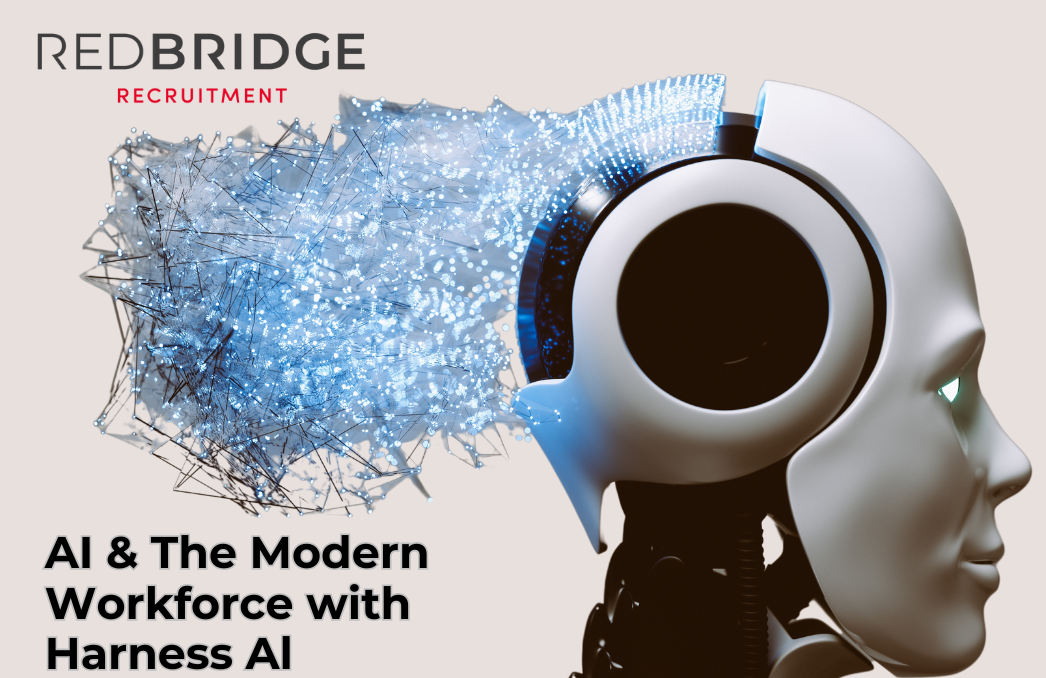
AI & The Modern Workforce with Harness AI
07 November 2024
In recent years, the conversation around AI has been growing louder. At Redbridge Recruitment, we’ve discussed AI with many of our clients and candidates to understand how they are leveraging this technology. However, there is still a significant amount of apprehension, with many fearing that AI might replace jobs. To address these concerns, Lucy and Hannah sat down with Rob and Ben from HarnessAI.
Some people are worried that AI will take jobs in financial services, is that the case or is there more to it?
It’s understandable that there’s concern about AI potentially displacing jobs in financial services. However, history shows us that technological revolutions often create more opportunities than they eliminate. While AI can automate certain tasks, the current generation of AI models isn’t without flaws. For example, they can sometimes produce “hallucinations,” generating information that isn’t accurate or factual. This means they can’t be left to operate unchecked, especially in tasks that require precision and reliability.
Rather than viewing AI as a job stealer, it’s more productive to see it as a tool that enhances human capabilities. AI opens up possibilities that previously required specialised skills, like coding, making advanced functionalities accessible to a broader range of people. So, while AI isn’t going to replace your job anytime soon, there’s a saying worth noting: the person who knows how to use AI might. Staying AI-literate is becoming increasingly important—much like becoming computer-literate was essential in the early 2000s—to remain competitive in the evolving job market.
So which teams in financial services are going to benefit from AI as an assistant?
AI has the potential to assist a wide array of teams within financial services. The most obvious beneficiaries are roles that involve substantial content creation, such as Marketing, Sales, and Human Resources. For these teams, generative AI can help with drafting proposals, creating marketing materials, or composing policy documents, directly enhancing the core aspects of their jobs.
But the advantages of AI extend far beyond these functions. Less obvious use cases exist across nearly every job type, including areas like coaching and feedback, guidance and learning, brainstorming, data entry, and analysis. For instance, generative AI can act as an expert consultant on any documented tool or system. Need to create a complex function in Excel? AI can generate it for you instantly, saving time and reducing errors.
Moreover, AI serves as an efficient answer generator, streamlining the research process on well-documented topics. To maximise the return on investment from adopting generative AI, it’s crucial for every employee to understand how and when to use it effectively. By fostering AI literacy across all teams, organisations can unlock significant productivity gains and stay ahead in a rapidly evolving industry.
Can you provide a brief overview of what your company, HarnessAI, does, especially for those unfamiliar with AI, and share what inspired you to start it?
We were inspired to start HarnessAI after the launch of ChatGPT, which dramatically lowered barriers to accessing AI. Suddenly, anyone with a computer and internet could leverage tools once reserved for technical experts. Yet, few people are effectively using AI at work due to a lack of awareness and understanding.
Recognising the immediate benefits AI could bring with the right training, we were motivated to bridge this gap. We are passionate about seeing people surprised and impressed by how their work transforms when they learn generative AI skills.
HarnessAI helps organisations unlock the power of artificial intelligence through tailored training programs and adoption coaching. Our mission is to empower non-technical teams to use AI tools, enabling them to be more productive. By demystifying AI and its wide range of use cases, we allow teams to transform their work and stay ahead in a rapidly evolving landscape.
Our approach consists of three key steps:
- Inspire and Engage: Demonstrating real-world AI use cases that deliver immediate value to gain buy-in.
- Practical Workshops: Guiding teams in hands-on learning and experimenting with essential AI skills under expert guidance.
- Ongoing Support: Providing continued consultation to embed new skills into daily operations, ensuring lasting results.
Who are the types of companies or teams you usually work with?
The interesting thing about generative AI (genAI) is that it impacts every corporate role. However, we tend to focus on small and medium-sized enterprises (SMEs) because they stand to gain the most.
- Boosting Efficiency with Limited Resources: SMEs often have tight budgets and small teams. GenAI automates tasks and streamlines operations, helping them achieve more with less and compete with bigger companies.
- Bridging the Tech Adoption Gap: Many SMEs hesitate to adopt new technologies due to cost and expertise barriers. We provide accessible genAI solutions to help them stay competitive in a digital world.
- Getting Ahead with Upskilling: Large corporations are developing in-house AI tools but will need time to implement solutions before upskilling their staff. SMEs can adopt genAI now and start upskilling immediately, gaining a competitive edge.
In conclusion, AI is not here to take over jobs, but rather to enhance and transform the way we work. However, it’s crucial to embrace and learn how to use AI effectively. Those who are open and willing to adapt to this technology may find themselves at a significant advantage in the job market. If you’re interested in learning more about how Harness AI can help you leverage AI, please reach out to them directly











